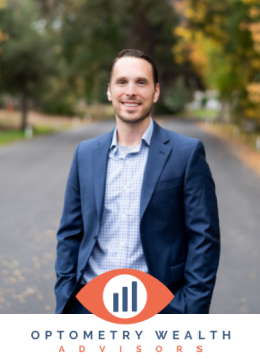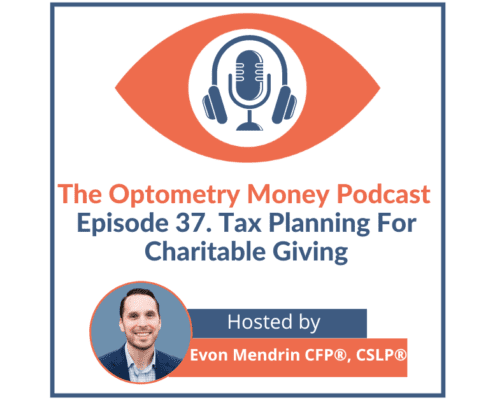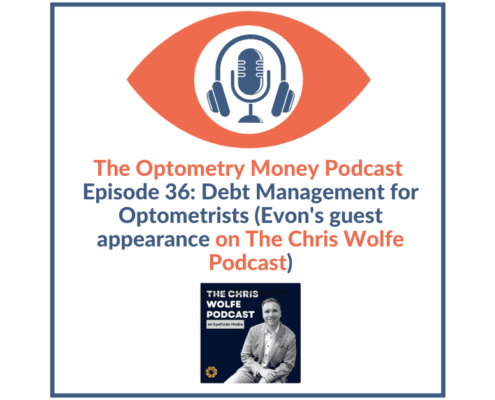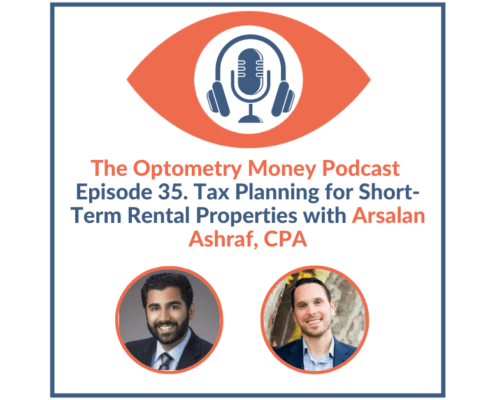The Optometry Money Podcast 100th Episode! What You Should Expect From Working With a Financial Advisor
In the show’s 100th episode, Evon talks about what optometrists should expect and experience from working with a financial advisory firm.
There has been historically poor business models in financial services that fall short of providing advice optometrists need, in their best interest. There also appears to not be a great public awareness of what good financial advisors actually do for clients
Evon aims to help optometrists understand what exactly financial planning is, and what they should be receiving from working with a financial advisor in terms of services received and client experience, by walking the listener through his firm’s own client experience.
As you search for your own trusted advisor, hopefully this episode gives you a better idea of what to expect, and when a potential service doesn’t quite meet your needs.
Have questions on anything discussed or want to have topics or questions featured on the show? Send Evon an email at podcast@optometrywealth.com.
Check out www.optometrywealth.com to get to know more about Evon, his financial planning firm Optometry Wealth Advisors, and how he helps optometrists nationwide. From there, you can schedule a short Intro call to share what’s on your mind and learn how Evon helps ODs master their cash flow and debt, build their net worth, and plan purposefully around their money and their practices.
Resources mentioned on this episode:
The Optometry Money Podcast is dedicated to helping optometrists make better decisions around their money, careers, and practices. The show is hosted by Evon Mendrin, CFP®, CSLP®, owner of Optometry Wealth Advisors, a financial planning firm just for optometrists nationwide.
Subscribe to our podcast below!
Episode Transcript
Episode 100 Transcript
[00:00:00] Hey, everybody. Welcome back to The Optometry Money Podcast, where we’re helping OD’s all over the country, make better and better decisions around their money, their careers, and their practices. I am your host, Evon Mendrin Certified Financial Planner(TM) practitioner and owner of Optometry Wealth Advisors, independent financial planning firm, just for optometrists nationwide.
[00:00:26] Evon: And thank you so much for listening and I am thrilled to be here once again for episode 100.
[00:00:35] And thank you. Thank you. And, It’s been a lot of fun. I can’t believe we’re through 100 episodes already. It’s been just so much fun talking through all these different topics, having great conversations with fantastic guests and hearing the feedback and questions from listeners and. Listeners reaching out to engage with my firm as, as clients.
[00:00:56] And you never really know when you start a content project like this, like how, how it’s going to go. Is anyone going to listen or, you know, are you able to keep that consistency? And I just so appreciate you taking the time and energy out of your day to listen.
[00:01:11] And I hope it’s been a valuable addition to your life. And I know every episode isn’t necessarily a home run, but I hope that my batting average is high enough that it’s a valuable. Addition to your life, in addition to all the other, just phenomenal podcasts being created to serve Optometry, both financial related and practice management related and otherwise.
[00:01:32] And so just really appreciate it. And I’m excited to see what the next hundred episodes bring us . And today I want to talk through what you should expect when engaging a financial advisor for services. What services should you expect to receive? What should that client experience look like?
[00:01:50] the reason I want to talk through this is because I’ve personally, as an advisor to OD’s, seen enough scenarios where optometrists have engaged with financial professionals of all sorts of titles.
[00:02:02] And ended up with a lot of products that aren’t necessarily the best fit for their life. A lot of expensive life insurance policies. Overly expensive and investment products or just sort of a service where assets are gathered and charged on and not really much is provided outside of that.
[00:02:22] And they’re coming to me asking, like, did we do the right thing? And so there are a lot of situations I see where it’s suggested to optometrists to purchase the products that are simply just not in their best interests at the time. It’s not appropriate. And that’s often the first experience that many ODs have with financial professionals and that sort of can become the expectation of what you’d receive when working with a financial advisor. Which I understand I’ve been practicing for, I mean, this is 10 years now.
[00:02:52] And my earliest, couple of years working in financial services was at a business model like that. And I’m very familiar with that side of financial services.
[00:03:03] And I also see very often the opinion that financial advisor’s services are equivalent to like an S&P 500 index fund, that if you just remove the advisor from your life and replaced him or her with an index fund that all your financial issues are solved. Which is silly to me because you’re comparing a product, a tool, with a professional service. It’s like comparing cheap frames that I can buy online with the valuable services of a skilled optometrist, it’s it’s apples to oranges.
[00:03:34] So. There definitely seems to be just not a great awareness of what good advisory firms actually do for clients, what they actually provide for clients. Which is our fault as financial advisors, we just, haven’t done a good job of communicating that to the public.
[00:03:50] So on the one hand we have a long history of business models that haven’t always served consumers in their best interest.
[00:03:59] And on the other hand, not really a great awareness of what advisors actually do for their clients. So as you might be thinking about working with a financial planning firm or are currently in a scenario that I described above, I wanted to show you, I want it to walk you through what you should actually expect from financial advisor services in terms of the services you get and the overall experience. To at least give you sort of a benchmark, a gauge to say, okay, this is like, what, this is actually what you could look for in that relationship.
[00:04:33] And, and I’m going to do that by walking through my own firm’s client experience. And there are many versions and variations of this. This is definitely isn’t the only way to deliver a service like this. But, it should give you a pretty good idea of what to look for, what to think about as you search for your own trusted professional. For your own family.
[00:04:54] What is financial planning?
[00:04:54] Evon: And just to start with, like in general, what is financial planning?
[00:04:58] I think that’s sort of confusing a lot of times. What does that even mean? Well, the CFP board, which oversees the Certified Financial Planner(TM) designation, says that “financial planning involves looking at a client’s entire financial picture and advising them on how to achieve their short and long-term financial goals. From saving for education and planning for retirement. To effectively managing taxes and insurance. Financial planners develop valuable relationships with their clients to provide them with confidence today in a more secure tomorrow”. A little bit of a fluff in that language, but it gives you a good idea of how to think about what in the world is financial planning.
[00:05:37] What does that mean? And ultimately it’s helping you to navigate important financial decisions. In every aspect of your life from managing cashflow and decisions around student loans, to tax planning, and practice finances and estate planning and everything in between.
[00:05:54] And ideally you’re not looking at all these different things in silos, but looking at how decisions around one thing impacts everything else.
[00:06:02] And from the first conversation, the first time I talk with a family, there’s usually a range of top priorities. Like what’s, what’s the top thing on their mind at the time that causes them to reach out and. Some are seeing their practices grow and their cashflow grow and they want to know they’re making the right decisions with their income.
[00:06:20] Like they they’re fascinated with finances and, they’re so focused on their work and their business that they want some guidance to make sure that they’re making the right decisions with, with this additional growing income. Others are concerned about taxes and want to have a more proactive conversation and projections around taxes, rather than just sort of being surprised at the end of the tax year. Student loans have been a huge topic over the last year or so with, with all the changes that have happened and payments restarting, from the COVID freeze. As mentioned earlier, reviewing some types of the insurance policies or investments that have been recommended by others to them. Sometimes it’s event driven, like after a practice purchase or kids being born or leading up to the sale of a location or a practice or something like that, sometimes there’s a, a life event that’s that’s on top of mind.
[00:07:09] And so I simply start the whole process with a short intro call which just gives me an opportunity to get to know you. And learn about what’s on your mind, share with you a bit about our services and our firm, and just to make sure we’re overall a good fit for what you’re looking for.
[00:07:25] From there we have what I call a feedback conversation and. This gives me a chance to review some parts of your finances and provide some feedback, you know, having talked through the different parts of your finances that I see here are some things that I see and am thinking about. So that at least if you do nothing with me, you can take that information and build on it. And just from that, I can usually point out some areas that the family just hasn’t thought about or things that they can go and work on. And it gives the optometrist the chance to ask more questions.
[00:07:57] Ultimately, we want to make sure that a four canopy and a, a longterm relationship with, with one another, we want to make sure we have a good understanding and we feel like we’re a good fit.
[00:08:06] We want to, we want to know that there’s been time to think this through and that it’s, it’s the right decision for you and your family. After that second conversation is usually where someone decides whether they want to move forward in some way or simply part ways.
[00:08:20] So when someone decides they want to move forward, this is really where the work begins.
[00:08:23] We start by taking sort of a deep dive health assessment of your finances. A full testing and diagnostic. And we have several conversations reviewing every specific topic related to your finances. So we start by just getting everything organized, gathering documents, like tax returns or account statements or debt statements. Gathering all the different parts of your finances.
[00:08:49] And it’s amazing what, just getting things organized and in one place could do for someone. And this helps me to know that I have enough information to actually provide advice. Then we meet about each particular topic, starting with the higher priorities, right? The highest priorities that are on your mind or things that we just see as a top priority. And we review and talk through them and take actions on one topic at a time.
[00:09:16] So we’ll start with student loan decisions, if student loans are still a part of your life, and make sure that we’re on the right repayment plan for your situation. And we’ll talk about debts and cashflow.
[00:09:27] We’ll start with an initial tax projection, and I’ll have reviewed your tax returns, and we’ll talk about different tax planning considerations for, for your family.
[00:09:35] And I’ll get in touch and work really closely with your tax professional to make sure that we’re all on the same page and on the same track.
[00:09:42] For the practice owners, we’ll dive into practice financials, helping you to have a, a better understanding of what’s happening in your business financially and how that impacts your, your personal finances.
[00:09:53] We’ll have a whole conversation about investing, which interestingly, the investments may not even come up until a few conversations in. Starting with education about how investments work. Why we invest the way that we do. And ultimately helping you to settle on the right mix of stocks and real estate versus bonds that meets your unique needs.
[00:10:16] We want to agree on the right mix of investments that are appropriate for your situation. And then that’s where I go to work. Looking at all of your accounts that you’re investing in, including your 401k accounts, and investing these accounts based on that agreed upon mix making sure that the right categories of investments or funds are in the right type of accounts, keeping in mind, things like taxes, where, where that’s appropriate. We’ll review insurance coverages across all the different
[00:10:42] types of insurances, making sure that you have the, the right amount of coverage and the right types of policies that fit your needs. And I don’t sell insurance so I worked really closely with an insurance broker, with my clients to, to take care of those insurance needs. Once we’ve had that conversation or your own agent or your own broker. To make changes as needed.
[00:11:03] We’ll go through and review your estate plan, which is commonly an area of, oh, just say improvement in a lot of the families that I work with . And we’ll review your estate planning documents and beneficiaries. I’ll diagram out the estate plan.
[00:11:16] We’ll talk through it and just talk about how things transfer from you to the next person, to the heir should something happen to you and we’ll talk through the considerations and make sure it still fits with your desired outcomes when you, when you first put it together. And it’s quite often, families really don’t even know what’s in these documents . They know they have something, but aren’t really sure what it is. And even recent grads have beneficiaries to review. As you likely have some form of retirement account or investment account or something like that.
[00:11:46] And from there we can connect and work really closely with a knowledgeable estate planning attorney to get true legal advice and to make adjustments or, or. New documents as, as needed.
[00:11:57] And then whatever other topics come up, whether it’s retirement specific for those more senior doctors, closer to that point in their life, whether it’s a college planning related or whatever it may be. We dive into one topic at a time , identify areas for improvement and take action where needed.
[00:12:16] And, you get the sense that this requires some work, right? There’s effort involved in good financial planning, both on, on our side, in the advisory firm, but also from, from you, the client.
[00:12:27] And it’s definitely not the same as having someone just gather assets and invest them and move on with your life. There’s there’s some work involved, but good financial planning, good financial decision making does require some work and effort, especially in the beginning.
[00:12:44] And once we’ve had a chance to review each topic or someone just needs a break for me and wants to come up for air, we’ll move on to our annual service calendar. And the way I’ve thought about this is that it allows me to proactively track and monitor the health of your finances. Throughout every year, much like you might want to track. I don’t know, like the, the eye pressure or acuity of a patient over time.
[00:13:06] And so for my firm every month, has a particular financial topic or part of your finances that my firm will review on your behalf, track, and keep an eye on and touch base with you on. And we want to proactively keep an eye on when changes need to be made due to changes in your life or finances or track progress on different things.
[00:13:28] Make sure there’s no actions that are not done that are just sort of lingering out there. Proactively talk about changes in law related to taxes or student loans or retirement plans.
[00:13:38] Ultimately, so as you are focusing on your work with patients, your, your time with family or for the practice owners on growing your business, you know, someone is watching these things. And keeping in touch with you on your behalf, taking the burden of, of monitoring all this off of your shoulders and onto a professional team.
[00:13:57] And just kind of describing the way that might look like is that earlier in the year, January through April, we’ll review the health of your cashflow of your different debts, we’ll review your progress towards financial independence, and the health of your investments.
[00:14:11] Mid year is usually where we’ll start to review tax returns, start those initial tax projections or conversations with your tax professional. And review those practice financials. Later in the year, we’ll review the different financial risks like your insurance coverages and estate plans.
[00:14:26] And. We’ll we’ll start to wrap up those tax conversations and take a look at the amount of liquidity in your life and make sure that that’s adequate for the things coming up over the next year. So every every month has a cadence and a topic for things that we want to review on your behalf. And then twice a year in the spring and the fall, we want to try to schedule conversations with you.
[00:14:45] So that we can talk with you, keep up with changes in your life, and talk about whatever topics are on our minds.
[00:14:50] And the investment management is simply a part of the service that is ongoing throughout the year and outside of those monthly touch points we’re accessible. So that as new questions come up, as new ideas come up, as new financial or life decisions need to be talked through, we can talk about those things proactively.
[00:15:07] There’s no. There’s no limitations on it. You know, any given month or anything like that, we’re, we’re, we’re accessible. We want to have a proactive relationship and open communication so we can talk through things before decisions are made. So while sometimes we can just add it to the agenda for the next meeting.
[00:15:25] We’re really just an email, a phone call or a zoom conversation away.
[00:15:30] And so that just continues on throughout the years and so that’s the general client experience, both upfront and sort of that deep dive testing and diagnostic, as well as the annual monitoring of your financial health and financial decisions and it’s really about tracking and monitoring progress and making ongoing improvements in all these different areas of your life.
[00:15:53] And keeping up with all of the changes in your family and career and in your businesses. And that’s how I view financial planning.
[00:16:02] And there are many variations of this. My peers with excellent businesses may provide this a different way , there are many ways that this service is delivered. But hopefully this gives you a better idea of what to expect when engaging with a financial advisor.
[00:16:16] Hopefully you can kind of see all of the different areas that a good advisory firm should be guiding you on in your, in your finances far beyond just the investment portfolio . Because from simply the percentage of financial professionals out there. With, with all due respect to my peers, I think the majority still work within business models that in my opinion and experience fall way too short of serving too many families in their best interests.
[00:16:44] And, of course, keep in mind your own needs. You know, maybe you don’t want ongoing services. Maybe you’d rather work on a short-term or hourly basis.
[00:16:52] And that’s great. That’s perfect. There. There’s a lot of variety available to you now. And as you search for that, you’ll want to know. Exactly the services that are provided to you and to make sure they meet your needs and your expectations. So, hopefully this was helpful.
[00:17:08] Again, really appreciate you following along so far over these hundred episodes. I’ve got a couple of great ones Coming up. We’ll be. We’ll have a Dr. Bethany Fishbein coming up in the next episode. And then we’ll be talking about, real estate tax planning. We’ll talking about how we can use real estate deductions to offset some of the other income in your life.
[00:17:26] So stay tuned over the next couple of weeks in the meantime, let me know if you have any questions you can reach out at podcast@optometrywealth.com. You can check out the resources I mentioned in this episode, as well as all the other episodes we’ve done at the education hub at my website, www.optometrywealth.com.
[00:17:44] And while you’re there, if you are interested in learning more about what it looks like to, to work together with my firm , you can schedule a no commitment, introductory call. And we can talk about whatever’s on your mind financially, and I can share how we serve optometrists, navigate those same things from all over the country. And with that, we’ll catch you on the next episode. In the meantime, take care.

RECENT POSTS
- The Optometry Money Podcast Ep 139: Optimize Your Pay – 7 Key Factors for Setting Practice Owners’ Compensation
- The Optometry Money Podcast Ep 138: The Big Beautiful Bill Act – Tax & Student Loan Reforms Optometrists Need to Watch
- The Optometry Money Podcast Ep 136: Creating a More Holistic Integrated Healthcare Patient Experience with Dr. Neda Gioia
- The Optometry Money Podcast Ep 135: Beyond Indexing – An Optometrist’s Guide to Factor-Based Investing
- The Optometry Money Podcast Ep 134: The Case for Index Funds – Why Optometrists Should Embrace Passive Investing

 Optometry Wealth Advisors LLC
Optometry Wealth Advisors LLC Optometry Wealth Advisors LLC
Optometry Wealth Advisors LLC Optometry Wealth Advisors LLC
Optometry Wealth Advisors LLC
 Optometry Wealth Advisors LLC
Optometry Wealth Advisors LLC